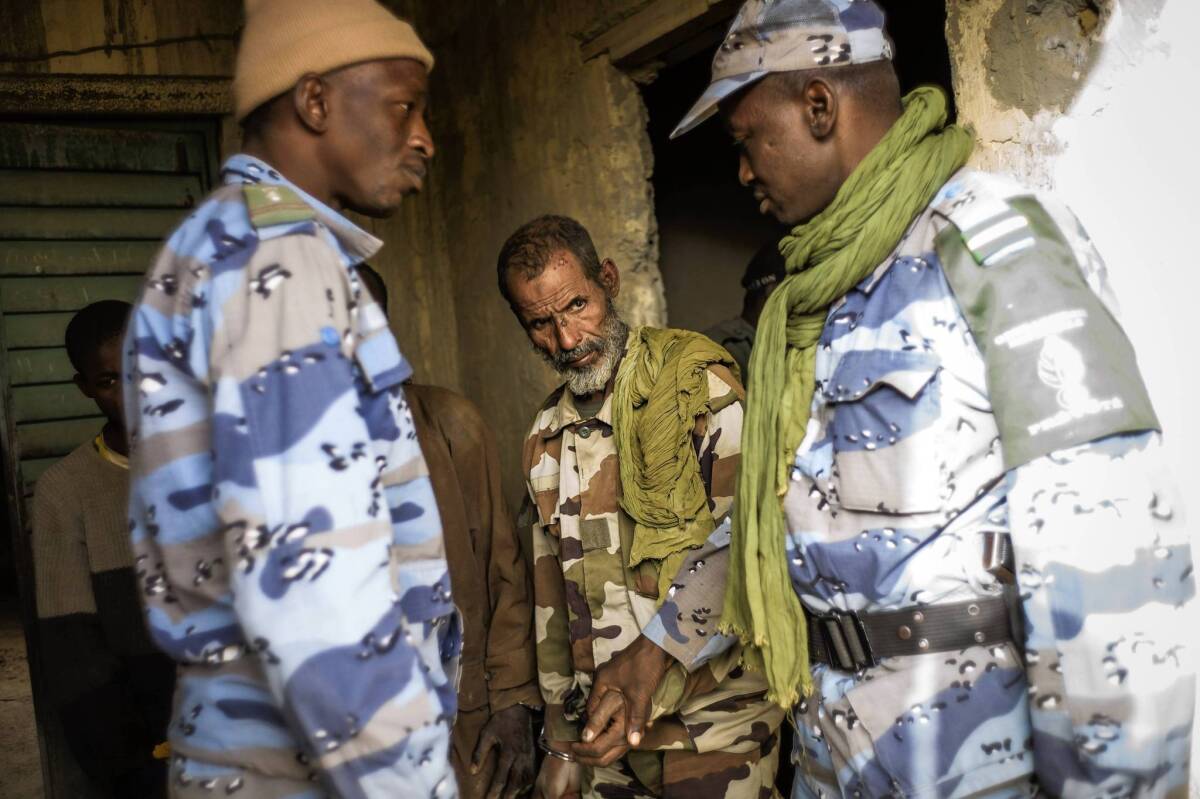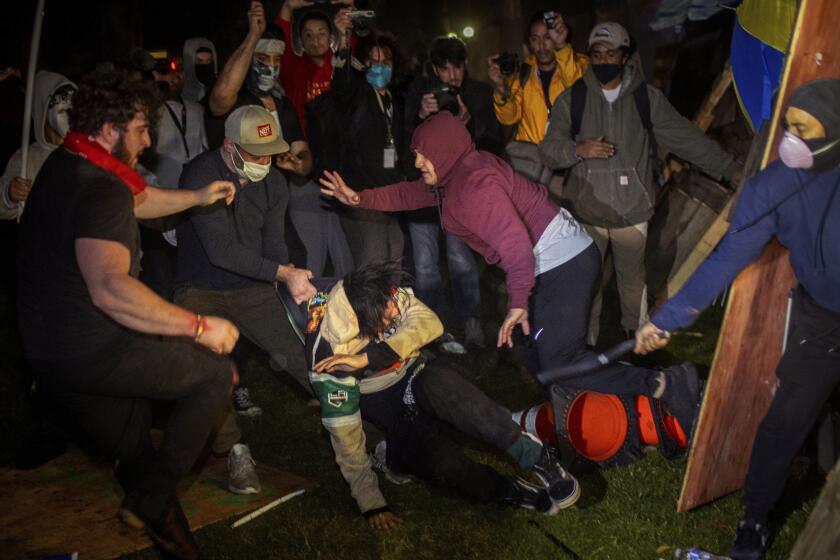African troops face a challenge after France leaves Mali

SEGOU, Mali — In swirls of red dust along a highway on the edge of the desert, the military convoys push north, French and Malian army forces pressing their advantage as town after town has fallen from the grip of Islamic militants.
Ancient, storied Timbuktu one day. Kidal, the last major militant stronghold, the next.
As insurgents have fallen back, France has made clear its intent to wind down the military intervention it launched Jan. 11, when it appeared that even the capital, Bamako, might be at risk and that Mali could become the next failed state where Al Qaeda affiliates could take root and strengthen.
French officials say it is time now for African troops to take over. But experts say the fight will be long, and almost certainly result in something less than complete success. Islamists are likely to melt into Mali’s great sweep of northern desert, an area roughly the size of France itself, with mountains, caves and other hide-outs where French officials acknowledge it will be difficult to track and fight them.
Despite millions of dollars in U.S. aid in recent years, Mali’s army still struggles with a culture of complacency and corruption. And other African armies arriving to take up the fight are only marginally better.
Geoff Porter, an analyst with the North Africa Risk Consulting firm, said Malian and allied African troops could probably secure the north only with the sustained presence of European forces and advisors.
“The objective is to transform northern Mali from an accommodating environment for terrorist groups to a hostile one,” he said. “Terrorist groups will likely continue to exist on the margins of communities in northern Mali, but their capabilities will be degraded.”
In a speech last week, U.S. Army Gen. Carter Ham, head of the Pentagon’s Africa Command, said it was unlikely the militants could be eliminated. “Probably the best you can get is containment and disruption, so that Al Qaeda is no longer able to control territory there as they do today.”
France has dedicated about 3,500 troops to the mission. The African contingent, from neighboring countries including Chad, Niger, Nigeria, Burkina Faso, Ghana and Ivory Coast, is expected to eventually grow to about 6,000. About a third have already arrived.
Even at that size, the Mali mission will be only about a third the size of a similar effort in Somalia, where about 17,000 troops backed by the United Nations have succeeded in driving an Al Qaeda affiliate from the capital and other key cities. But Somalia still suffers from frequent suicide bombings and assassinations of journalists, businessmen and others. Many predict Mali will face the same problems.
Most of the African forces have their own weaknesses. Critics say the Nigeria military’s abuses and brutality have complicated the fight against an Islamist insurgency in that country’s north. The Senegalese army was slow to deploy in Mali, reportedly because it lacked ammunition.
Mali got much of the $500-million Trans-Sahara Counter-Terrorism Partnership, an effort launched by the U.S. nearly a decade ago after the kidnapping of 32 people in neighboring Algeria. The premise was that with U.S. training and support, regional armies could take on the job of resisting groups linked to Al Qaeda.
The project also involved aid to promote democracy, including the distribution of radios to connect rural Malians with their government, and attempts to discredit Islamist ideology.
But military officers overthrew Mali’s civilian government last year, helping create a power vacuum that militants exploited by seizing the northern part of the country. They advanced rapidly again in recent months, exposing the army as an ill-disciplined, demoralized bunch desperately short of gasoline and ammunition and prone to human rights abuses.
In a better army, Boubacar Yatara might be a great soldier. But when militants attacked his position in the town of Alatona in central Mali in mid-January, he said, he had little ammunition and the mount on his heavy machine gun was so wobbly that he couldn’t shoot straight.
“The commanders don’t believe that there is not enough ammunition and that the weapons are bad, and they don’t do anything to look after the soldiers,” Yatara said.
In the attack at Alatona, soldiers managed to drive off the first wave of militants. But by the time the second wave struck, they had run out of ammunition.
“When the rebels got close, eight of my comrades fled and left me. I was the only one left,” he said, relating his harrowing escape. “I was trying to disable my weapon and I was shot in the helmet. If you see a soldier running away, it means he’s got nothing to defend himself with.”
Malik Doumbia, whose knee was shattered by a bullet at Alatona, said the Malian army “is sick.”
“I don’t want to die for nothing. You’re not afraid if you’ve got good equipment, but if you have bad equipment, you die for nothing,” he said.
“If the president came here now, I’d say it to his face,” he said from his hospital bed, waving his arms and his voice rising with passion. “Our commanders aren’t good. Everybody wants to fill his pocket and that’s all. They have money and they eat money. They build themselves big houses.”
Analyst Porter said the need for the current military campaign in Mali means the U.S. program to boost local forces was a failure.
“What does the U.S. have to show for its $500 million? A military government in Bamako and the French government asking for logistical support for Paris’ military campaign in northern Mali,” he said.
U.S. officials disagree. State Department officials defended the program as an effort with limited objectives that has worked well in most of the 10 African countries where it has been implemented. They said it was never intended to be strong enough to help stave off large insurgencies.
Yatara contends that Malians can be better than to let the militant threat expand again after the French withdraw. He said he is inspired by the example of his father, a soldier who died fighting rebels in Kidal in 2007.
“My father died in the same war I’m fighting, and I’ll die in that war too,” he said. “The day I became a soldier, my father told me that being a soldier is not just any job.
“We can defend the country if we listen to each other and we’re willing to work hard. We can prevent the rebels coming back.”
Despite narrowly escaping death last month, he’s ready to go back to war.
“For me, this job is not finished. I feel like my father is watching me as a soldier.”
Times staff writer Paul Richter in Washington contributed to this report.
More to Read
Start your day right
Sign up for Essential California for news, features and recommendations from the L.A. Times and beyond in your inbox six days a week.
You may occasionally receive promotional content from the Los Angeles Times.






